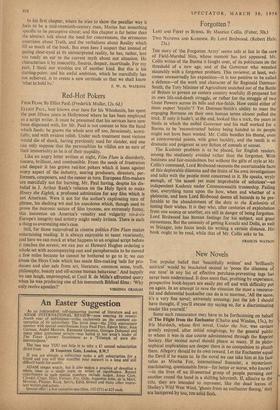Forgotten ?
LAST AND FIRST IN BURMA. By Maurice Collis. (Faber, 30s.) THE story of 'the Forgotten Army' seems safe at last in the care of Field-Marshal Slim, whose memoir has just appeared. Mr. Collis writes of the Burma it fought over, of its politicians on the threshold of a new age, and of the Governor who wrestled staunchly with a forgotten problem. This reviewer, at least, wel- comes unreservedly his exposition—it is too positive to be called a defence—of the work and character of Sir Reginald Dorman- Smith, the Tory Minister of Agriculture snatched out of the Battle of Britain to govern an eastern country woefully ill-prepared for its own life-and-death struggle, or rather for the struggle of two Great Powers across its hills and rice-fields. How could either of them expect 'loyalty'? Yet Dorman-Smith's ability to meet the engaging Burmese on their own human terms almost pulled the trick. If only it hadn't, at the end, looked like a trick, the years in Simla in which the exiled Governor and his staff worked for a Burma, to be 'reconstructed' before being handed to its people might not have been wasted. Mr. Collis handles his theme, even at controversial points, with great lucidity, and the result is as dramatic and poignant as any fiction of consuls at sunset. The Kashmir problem is to be placed, for English readers. among the studiously avoided rather than the forgotten. With boldness and fair-mindedness but without the gifts of style at Mr. Collis's command, Lord Birdwood recounts the ascertainable facts of this deplorable dilemma and the fruits of his own investigations and talks with the people most concerned in it. He speaks, wryly enough, of 'the sanest yet most improbable of solutions'—an independent Kashmir under Commonwealth trusteeship. Failing that, everything turns upon the how, when and whether of a plebiscite, and here Lord Birdwood deems all hazards to be pre- ferable to the abandonment of the duty to the Kashnziris of testing their wishes. It is they who, after centuries of exploitation from one source or another, are still in danger of being forgotten. Lord Birdwood has human feelings for his subject, and great earnestness. But the necessity of getting Karachi and Delhi, as well as Srinagar, into focus lends his writing a certain distance. His book ought to be read, while that of Mr. Collis asks to be.
FRANCIS WATSON


































 Previous page
Previous page